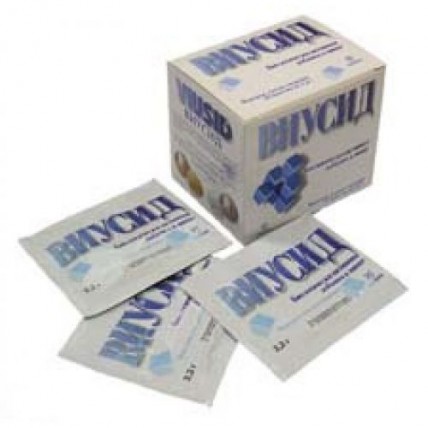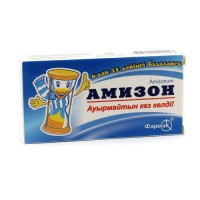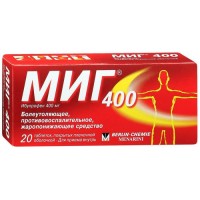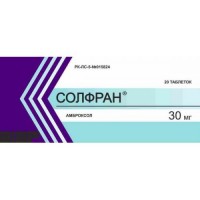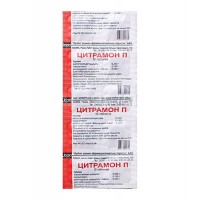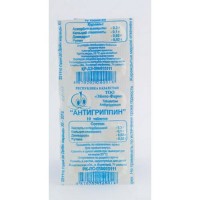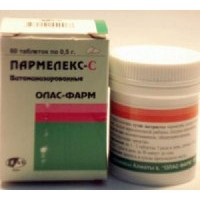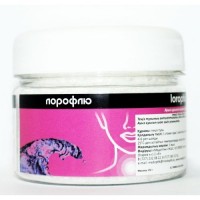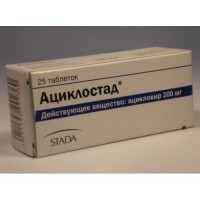The instruction
for medical use
of VIUSID medicine
A trade name
Viusid
Mezhdunarodnoye the unlicensed name
Is not present
the Dosage form
Powder for preparation of solution for intake of 4.5 g
Structure
One bag contains
active agents: glycyrrhizic acid of 46.9 mg,
glycosamine of 690 mg
arginine of 720 mg
glycine of 393 mg
ascorbic acid of 43 mg
pyridoxine hydrochloride of 0.59 mg
calcium pantothenate of 2.2 mg
folic acid of 0.068 mg
cyanocobalamine of 0.000395 mg
malic acid of 704 mg
zinc sulfate of 5 mg,
excipients: maltodextrin (maltitol), fragrance lemon (Brasil 162 A), fragrance mint (R 200 AN) of sodium methylparaben (E219), neohesperidin, gum guar.
The description Yellow-white powder with a characteristic smell.
Pharmacotherapeutic group
Immunomodulators. Immunostimulators.
The code of automatic telephone exchange L 03AX
Pharmacological
Pharmacokinetics Action properties of drug is cumulative action of its components therefore carrying out kinetic observations is not possible.
The pharmacodynamics
the Complex of active components VIUSIDA provides its biological and clinical performance.
Glycyrrhizic acid renders antiviral, anti-inflammatory, antipruritic and immunomodulatory action. Affects the DNA and RNA different types of in the vitro and in Vivo viruses (Varicella zoster, type Herpes simplex 1 and 2, various types of human papillomavirus, including oncogenous). Interrupts replication of viruses at early stages, causes a virion exit from a capsid, thereby without assuming its penetration into cells that it is connected with selection dose-dependent inhibition of the phosphorylating R. Vzaimodeystvuyet's kinase with structures of a virus (perhaps, with proteins), changing various phases of a virus cycle that is followed by an irreversible inactivation of the virus particles which are in a stand-at-ease out of cells. Blocks implementation of active virus particles in a cell, breaks ability of a virus to induction of synthesis of new virus particles.
Induces formation of interferon that is one of components of antiviral action. Inactivates the specified viruses in concentration, non-toxic for normally functioning cells. The mutant strains of viruses resistant to acyclovir and a yodouridin are also highly sensitive to glycyrrhizic acid, as well as not mutant strains. The anti-inflammatory activity of glycyrrhizic acid is combined with the stimulating influence on humoral and cellular factors of immunity. Significantly slows down emission of kinin by connective tissue cells in an inflammation zone.
The glycosamine stimulates biosynthesis of proteoglycans, restores the cartilaginous surfaces of joints, intervertebral disks.
Glycine
Is the central neurotransmitter regulating a metabolism normalizes and activates processes of protective braking in the central nervous system, reduces psychoemotional pressure, increases intellectual working capacity. Glycine possesses glycine - and GAMK-ergichesky, alfa1-adrenoceptor blocking, antioxidant, anti-toxic action, regulates activity of glutamate (NMDA) receptors.
L-glycine (glycine) - takes part in synthesis of the substances, major for an organism: nucleic acids, glutathione, bile acids, etc. Glycine is used in gem porphyrine predecessor synthesis in a hemoglobin molecule and also purine bases - the most important elements of nucleic acids. Glycine is included into structure of glutathione - the sulfur-containing substance playing a special role in the system of anti-radial protection.
Glycine participates in desintoxication reactions, being included hippuric acid and also in synthesis of bile acids (glycocholic acid). Besides, glycine is important in processes of biosynthesis of oxalic acid.
Stimulates release of a glucagon which metabolizes a glycogen in glucose.
Arginine is the nitrogen oxide mediator, a factor relaxing an endothelium of vessels of heart, a brain, peripheral vessels, its action is shown in improvement of warm activity, decrease in diastolic pressure, improvement of microcirculation in various bodies. Promotes mental concentration, improves processes of forming of short-term memory. Promotes stimulation of immunity due to activation of T-cells.
Ascorbic acid - water-soluble vitamin, plays an important role in regulation of oxidation-reduction processes, carbohydrate metabolism, blood clotting, angenesis, promotes increase in body resistance.
Ascorbic acid is a component of the system protecting an organism from harmful effects of free radicals and other oxidizers and also plays an important role in inflammatory processes and in the mechanism of action of leukocytes. Ascorbic acid participates in process of synthesis of intracellular mucopolysaccharides which along with collagenic fibers provide durability of walls of capillaries.
The pyridoxine a hydrochloride belongs to group of water-soluble vitamins (B6 vitamin). Fills shortage of B6 vitamin, has the regulating impact on exchange of amino acids, neurotransmitters.
In muscles (including in a myocardium) the pyridoxine activates processes of disintegration of a glycogen and optimizes energy balance in them in a hypoxia. Provides synthesis of niacin (RR vitamin) from tryptophane. Regulates exchange of glutaminic acid, methionine, cysteine.
In nervous system the pyridoxine participates in synthesis of neurotransmitters: noradrenaline, dopamine, glycine, GAMK and serotonin. At the same time it changes balance of the specified mediators towards prevalence of brake mediators of GAMK, glycine and also serotonin.
Stimulates synthesis of a gem in hemoglobin, increases synthesis of iron-binding protein of marrow (siderophilin), regulates exchange of B12 vitamin and folic acid.
Folic acid in in an organism is restored to the tetrahydrofolic acid which is the coenzyme participating in metabolic processes. It is necessary for normal formation of blood cells, including processes of maturing of megaloblasts and their transformation in normoblasts. Is a cofactor of the enzymes participating in synthesis of the purine and pirimidinovy bases, DNA and RNA, in synthesis of protein, amino acids (methionine, serine), in sincaline exchange.
Folic acid plays importance in cell fission processes that is especially important for fabrics which share actively and differentiated, promotes connection of proteinaceous groups and a gem in hemoglobin and a myoglobin. Finally, stimulates eritro-, leucio- and a thrombocytopoiesis, plastic and regenerator processes in all bodies and fabrics. The lack of folic acid slows down transition of a megaloblastichesky phase of a hemopoiesis to normoblastic and leads to megaloblastichesky anemia (increase in volume of erythrocytes).
Cyanocobalamine has metabolic, hemopoietic effect. In an organism (mainly in a liver) Cobamamidum which is an active form of cyanocobalamine and is a part of numerous enzymes, including composition of the reductase restoring folic acid in tetrahydrofolic turns into a koenzimny form adenozilkobalamin, or.
Cobamamidum participates in transfer of methyl and other one-carbonaceous fragments therefore it is necessary for formation of desoxyribose and DNA, creatine, methionine of the donor of methyl groups, in synthesis of a lipotropic factor of sincaline, for transformation of methyl-malonic acid into amber, being a part of a myelin, for utilization of propionic acid. It is necessary for a normal hemopoiesis promotes maturing of erythrocytes.
Activates the coagulant system of blood, in high doses causes increase in thromboplastic activity and activity of a prothrombin. Reduces concentration of cholesterol in blood. Has beneficial effect on function of a liver and nervous system. Increases ability of fabrics to regeneration.
Zinc sulfate stimulates synthesis of nucleic acids, proteins, angenesis, promotes increase in body weight. Zinc is necessary for functioning of insulin, hormones of gonads, maintains stability of cellular membranes, limiting release of a histamine from mast cells. He limits free radical reactions, prevents damage of cellular membranes. Zinc is necessary for normal activity of adenoid tissue, alkaline phosphatase, carboxypeptidases, alcohol dehydrogenase.
Zinc increases resistance to infectious diseases, promotes healing of wounds, accelerates growth, increases working capacity, improves memory, interferes with a hair loss.
Calcium pantothenate
Calcic salt of pantothenic acid, is a component of coenzyme A playing the central role in acetylation (tricarbonic acid cycle), in metabolism of fats, carbohydrates and amino acids.
Malic acid
Along with amber and lemon acids, is synthesized by all cells of an organism. Use of these major metabolites participating in redoxreactions and stimulating formation of energy through ATP synthesis allows an organism to receive more energy, than at anaerobic oxidation of glucose. Normalizes kompensatorno - metabolic reactions in body tissues of adults and children, activates oxidizing functions of mitochondrions.
Has anti-virus properties and the significant antioxidant effect. Restores operability of a cardiac muscle and other systems of an organism at exhaustion, after big physical activities and in a post-hypoxemic state, gives the chance in shorter terms (in 10-20 min.) to restore arterial blood pressure in hypotonia. Reduces toxic influence of alcohol, drugs.
Indications
as a part of complex therapy:
- hepatitis A, B, C
- a herpes infection (a herpes simplex virus 1 and 2 types, human papillomavirus, herpes Zoster)
- a Cytomegaloviral infection
- asthenic states
- opportunistic infections at HIV-positive patients
- flu and other SARS
the Route of administration and doses
Before the use powder VIUSIDA is dissolved in a small amount (100 ml) of water:
The adult
At treatment of acute viral infections, such, as: Cytomegaloviral, a herpes simplex virus, herpes Zoster, the human papillomavirus infection is recommended reception on 1 bag 2 times a day within 3 weeks.
In an acute viral hepatitis And, In, With on 1 bag 2 times a day within 4 weeks, then on 1-2 bags a day 3 times a week, are long (3 months)
At chronic forms of hepatitis on 1-2 bags a day within 2-3 months.
At asthenic states about 1 bag 2 times a day within 2-3 weeks is applied.
In opportunistic infections at HIV-positive patients
on 1 bag 2 times a day within 1-2 months, then a maintenance dose 1-2 bags a day 3 times a week are long.
For prevention and treatment of flu, a SARS - 2 bags a day 7-10dny.
In order to avoid emergence of allergic reactions prior to the beginning of a course of treatment it is necessary to carry out trial appointments in the minimum dosages (on & frac14, a bag 2 times a day within 2-3 days).
Side effects
- allergic reactions in the form of skin rash
- increase in activity of hepatic transaminases (nuclear heating plant, ALT).
Contraindications
- hypersensitivity to drug components - chronic hepatitis (maximum activity)
Medicinal interactions
is not recommended to accept VIUSID along with drugs: vitamins of group B (B6, B12), folic acid, vitamins A, With, glycine, calcium pantothenate, Essentiale and other complex drugs which are a part of components VIUSIDA.
Works synergistically with ά interferon, with antiretroviral drugs: acyclovir, gantsikloviry, reduces side effects of antiviral drugs.
At combined use VIUSIDA with glucocorticosteroids, dose VIUSIDA is recommended to be reduced.
The special
instructions Pregnancy and a lactation
during pregnancy and a lactation to accept after consultation with the doctor.
Use in pediatrics
the Experience of clinical use at children is limited. To children to apply on doctor's orders.
Features of influence of medicine on ability to run transport and potentially dangerous mechanisms
Drug does not affect ability to run transport and performance of the work demanding the increased concentration of attention.
The overdose
of Data on overdose is not available.
The form of release and packing
On 4.5 g of drug place in bags from 3-layer material: paper - aluminum foil polyethylene. On 90 bags together with the instruction for medical use in the state and Russian languages put in a cardboard pack.
To Store storage conditions at a temperature not over 25OC.
To store out of children's reach!
3 years
not to use a period of storage after the expiry date specified on packing.
Prescription status
Without prescription
the Producer Katalisis, S.L.
Makarena, 14
28016, Madrid-Spain.
The address of the organization accepting in the territory of the Republic of Kazakhstan claims from consumers on quality of drug
of ORAI Gosudarstvennaya LLP license No. OP64602914P of 30.03.2002.
Republic of Kazakhstan, Almaty, Seyfullin St. 460, office 321
phone number: +7 (727) 2790329,2790325, +7 (727) fax: 2797671
e-mail:
To develop info@orai.kz
for medical use
of VIUSID medicine
A trade name
Viusid
Mezhdunarodnoye the unlicensed name
Is not present
the Dosage form
Powder for preparation of solution for intake of 4.5 g
Structure
One bag contains
active agents: glycyrrhizic acid of 46.9 mg,
glycosamine of 690 mg
arginine of 720 mg
glycine of 393 mg
ascorbic acid of 43 mg
pyridoxine hydrochloride of 0.59 mg
calcium pantothenate of 2.2 mg
folic acid of 0.068 mg
cyanocobalamine of 0.000395 mg
malic acid of 704 mg
zinc sulfate of 5 mg,
excipients: maltodextrin (maltitol), fragrance lemon (Brasil 162 A), fragrance mint (R 200 AN) of sodium methylparaben (E219), neohesperidin, gum guar.
The description Yellow-white powder with a characteristic smell.
Pharmacotherapeutic group
Immunomodulators. Immunostimulators.
The code of automatic telephone exchange L 03AX
Pharmacological
Pharmacokinetics Action properties of drug is cumulative action of its components therefore carrying out kinetic observations is not possible.
The pharmacodynamics
the Complex of active components VIUSIDA provides its biological and clinical performance.
Glycyrrhizic acid renders antiviral, anti-inflammatory, antipruritic and immunomodulatory action. Affects the DNA and RNA different types of in the vitro and in Vivo viruses (Varicella zoster, type Herpes simplex 1 and 2, various types of human papillomavirus, including oncogenous). Interrupts replication of viruses at early stages, causes a virion exit from a capsid, thereby without assuming its penetration into cells that it is connected with selection dose-dependent inhibition of the phosphorylating R. Vzaimodeystvuyet's kinase with structures of a virus (perhaps, with proteins), changing various phases of a virus cycle that is followed by an irreversible inactivation of the virus particles which are in a stand-at-ease out of cells. Blocks implementation of active virus particles in a cell, breaks ability of a virus to induction of synthesis of new virus particles.
Induces formation of interferon that is one of components of antiviral action. Inactivates the specified viruses in concentration, non-toxic for normally functioning cells. The mutant strains of viruses resistant to acyclovir and a yodouridin are also highly sensitive to glycyrrhizic acid, as well as not mutant strains. The anti-inflammatory activity of glycyrrhizic acid is combined with the stimulating influence on humoral and cellular factors of immunity. Significantly slows down emission of kinin by connective tissue cells in an inflammation zone.
The glycosamine stimulates biosynthesis of proteoglycans, restores the cartilaginous surfaces of joints, intervertebral disks.
Glycine
Is the central neurotransmitter regulating a metabolism normalizes and activates processes of protective braking in the central nervous system, reduces psychoemotional pressure, increases intellectual working capacity. Glycine possesses glycine - and GAMK-ergichesky, alfa1-adrenoceptor blocking, antioxidant, anti-toxic action, regulates activity of glutamate (NMDA) receptors.
L-glycine (glycine) - takes part in synthesis of the substances, major for an organism: nucleic acids, glutathione, bile acids, etc. Glycine is used in gem porphyrine predecessor synthesis in a hemoglobin molecule and also purine bases - the most important elements of nucleic acids. Glycine is included into structure of glutathione - the sulfur-containing substance playing a special role in the system of anti-radial protection.
Glycine participates in desintoxication reactions, being included hippuric acid and also in synthesis of bile acids (glycocholic acid). Besides, glycine is important in processes of biosynthesis of oxalic acid.
Stimulates release of a glucagon which metabolizes a glycogen in glucose.
Arginine is the nitrogen oxide mediator, a factor relaxing an endothelium of vessels of heart, a brain, peripheral vessels, its action is shown in improvement of warm activity, decrease in diastolic pressure, improvement of microcirculation in various bodies. Promotes mental concentration, improves processes of forming of short-term memory. Promotes stimulation of immunity due to activation of T-cells.
Ascorbic acid - water-soluble vitamin, plays an important role in regulation of oxidation-reduction processes, carbohydrate metabolism, blood clotting, angenesis, promotes increase in body resistance.
Ascorbic acid is a component of the system protecting an organism from harmful effects of free radicals and other oxidizers and also plays an important role in inflammatory processes and in the mechanism of action of leukocytes. Ascorbic acid participates in process of synthesis of intracellular mucopolysaccharides which along with collagenic fibers provide durability of walls of capillaries.
The pyridoxine a hydrochloride belongs to group of water-soluble vitamins (B6 vitamin). Fills shortage of B6 vitamin, has the regulating impact on exchange of amino acids, neurotransmitters.
In muscles (including in a myocardium) the pyridoxine activates processes of disintegration of a glycogen and optimizes energy balance in them in a hypoxia. Provides synthesis of niacin (RR vitamin) from tryptophane. Regulates exchange of glutaminic acid, methionine, cysteine.
In nervous system the pyridoxine participates in synthesis of neurotransmitters: noradrenaline, dopamine, glycine, GAMK and serotonin. At the same time it changes balance of the specified mediators towards prevalence of brake mediators of GAMK, glycine and also serotonin.
Stimulates synthesis of a gem in hemoglobin, increases synthesis of iron-binding protein of marrow (siderophilin), regulates exchange of B12 vitamin and folic acid.
Folic acid in in an organism is restored to the tetrahydrofolic acid which is the coenzyme participating in metabolic processes. It is necessary for normal formation of blood cells, including processes of maturing of megaloblasts and their transformation in normoblasts. Is a cofactor of the enzymes participating in synthesis of the purine and pirimidinovy bases, DNA and RNA, in synthesis of protein, amino acids (methionine, serine), in sincaline exchange.
Folic acid plays importance in cell fission processes that is especially important for fabrics which share actively and differentiated, promotes connection of proteinaceous groups and a gem in hemoglobin and a myoglobin. Finally, stimulates eritro-, leucio- and a thrombocytopoiesis, plastic and regenerator processes in all bodies and fabrics. The lack of folic acid slows down transition of a megaloblastichesky phase of a hemopoiesis to normoblastic and leads to megaloblastichesky anemia (increase in volume of erythrocytes).
Cyanocobalamine has metabolic, hemopoietic effect. In an organism (mainly in a liver) Cobamamidum which is an active form of cyanocobalamine and is a part of numerous enzymes, including composition of the reductase restoring folic acid in tetrahydrofolic turns into a koenzimny form adenozilkobalamin, or.
Cobamamidum participates in transfer of methyl and other one-carbonaceous fragments therefore it is necessary for formation of desoxyribose and DNA, creatine, methionine of the donor of methyl groups, in synthesis of a lipotropic factor of sincaline, for transformation of methyl-malonic acid into amber, being a part of a myelin, for utilization of propionic acid. It is necessary for a normal hemopoiesis promotes maturing of erythrocytes.
Activates the coagulant system of blood, in high doses causes increase in thromboplastic activity and activity of a prothrombin. Reduces concentration of cholesterol in blood. Has beneficial effect on function of a liver and nervous system. Increases ability of fabrics to regeneration.
Zinc sulfate stimulates synthesis of nucleic acids, proteins, angenesis, promotes increase in body weight. Zinc is necessary for functioning of insulin, hormones of gonads, maintains stability of cellular membranes, limiting release of a histamine from mast cells. He limits free radical reactions, prevents damage of cellular membranes. Zinc is necessary for normal activity of adenoid tissue, alkaline phosphatase, carboxypeptidases, alcohol dehydrogenase.
Zinc increases resistance to infectious diseases, promotes healing of wounds, accelerates growth, increases working capacity, improves memory, interferes with a hair loss.
Calcium pantothenate
Calcic salt of pantothenic acid, is a component of coenzyme A playing the central role in acetylation (tricarbonic acid cycle), in metabolism of fats, carbohydrates and amino acids.
Malic acid
Along with amber and lemon acids, is synthesized by all cells of an organism. Use of these major metabolites participating in redoxreactions and stimulating formation of energy through ATP synthesis allows an organism to receive more energy, than at anaerobic oxidation of glucose. Normalizes kompensatorno - metabolic reactions in body tissues of adults and children, activates oxidizing functions of mitochondrions.
Has anti-virus properties and the significant antioxidant effect. Restores operability of a cardiac muscle and other systems of an organism at exhaustion, after big physical activities and in a post-hypoxemic state, gives the chance in shorter terms (in 10-20 min.) to restore arterial blood pressure in hypotonia. Reduces toxic influence of alcohol, drugs.
Indications
as a part of complex therapy:
- hepatitis A, B, C
- a herpes infection (a herpes simplex virus 1 and 2 types, human papillomavirus, herpes Zoster)
- a Cytomegaloviral infection
- asthenic states
- opportunistic infections at HIV-positive patients
- flu and other SARS
the Route of administration and doses
Before the use powder VIUSIDA is dissolved in a small amount (100 ml) of water:
The adult
At treatment of acute viral infections, such, as: Cytomegaloviral, a herpes simplex virus, herpes Zoster, the human papillomavirus infection is recommended reception on 1 bag 2 times a day within 3 weeks.
In an acute viral hepatitis And, In, With on 1 bag 2 times a day within 4 weeks, then on 1-2 bags a day 3 times a week, are long (3 months)
At chronic forms of hepatitis on 1-2 bags a day within 2-3 months.
At asthenic states about 1 bag 2 times a day within 2-3 weeks is applied.
In opportunistic infections at HIV-positive patients
on 1 bag 2 times a day within 1-2 months, then a maintenance dose 1-2 bags a day 3 times a week are long.
For prevention and treatment of flu, a SARS - 2 bags a day 7-10dny.
In order to avoid emergence of allergic reactions prior to the beginning of a course of treatment it is necessary to carry out trial appointments in the minimum dosages (on & frac14, a bag 2 times a day within 2-3 days).
Side effects
- allergic reactions in the form of skin rash
- increase in activity of hepatic transaminases (nuclear heating plant, ALT).
Contraindications
- hypersensitivity to drug components - chronic hepatitis (maximum activity)
Medicinal interactions
is not recommended to accept VIUSID along with drugs: vitamins of group B (B6, B12), folic acid, vitamins A, With, glycine, calcium pantothenate, Essentiale and other complex drugs which are a part of components VIUSIDA.
Works synergistically with ά interferon, with antiretroviral drugs: acyclovir, gantsikloviry, reduces side effects of antiviral drugs.
At combined use VIUSIDA with glucocorticosteroids, dose VIUSIDA is recommended to be reduced.
The special
instructions Pregnancy and a lactation
during pregnancy and a lactation to accept after consultation with the doctor.
Use in pediatrics
the Experience of clinical use at children is limited. To children to apply on doctor's orders.
Features of influence of medicine on ability to run transport and potentially dangerous mechanisms
Drug does not affect ability to run transport and performance of the work demanding the increased concentration of attention.
The overdose
of Data on overdose is not available.
The form of release and packing
On 4.5 g of drug place in bags from 3-layer material: paper - aluminum foil polyethylene. On 90 bags together with the instruction for medical use in the state and Russian languages put in a cardboard pack.
To Store storage conditions at a temperature not over 25OC.
To store out of children's reach!
3 years
not to use a period of storage after the expiry date specified on packing.
Prescription status
Without prescription
the Producer Katalisis, S.L.
Makarena, 14
28016, Madrid-Spain.
The address of the organization accepting in the territory of the Republic of Kazakhstan claims from consumers on quality of drug
of ORAI Gosudarstvennaya LLP license No. OP64602914P of 30.03.2002.
Republic of Kazakhstan, Almaty, Seyfullin St. 460, office 321
phone number: +7 (727) 2790329,2790325, +7 (727) fax: 2797671
e-mail:
To develop info@orai.kz
